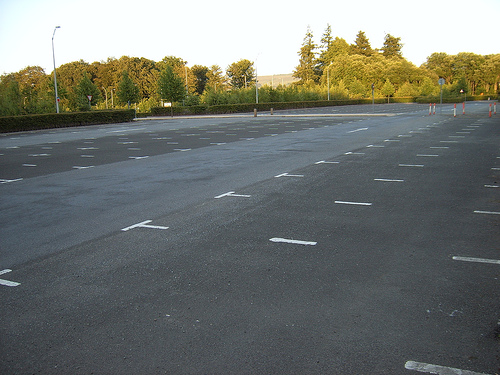Who doesn’t like freebies? Commuters in the D.C. area stayed true to expectations, and told researchers at Virginia Tech University (VTU) that take advantage of free parking when employers offer it. Commuters also said that they’d choose free parking over other transportation benefits, such as those for public transit or other travel modes, like biking or walking.

The presence of free parking is the single most influential determining factor of employee transport choices. From Goat’s Greetings.
The findings, which were published in the Journal of Public Transportation, are the result of a study conducted by VTU professor Ralph Buehler, who teaches urban affairs and planning, and doctoral candidate Andrea Hamre. The two surveyed 4,630 adults who work full-time and commute regularly from DC’s urban core or its inner suburbs, noting each respondent’s commute mode and any commuter benefits offered at work.
They found that employees who were offered public transit benefits or showers, lockers, or bike parking (but no free parking) were more likely to ride public transportation, walk, or cycle to work. Throw free parking into the mix of incentives, however, and workers resoundingly chose it above the others.
In fact, when no benefits of any kind were offered — neither free parking nor any for public transportation or other commuting modes — the percentage of commuters who drove alone to work was still lower than when commuters were offered free parking and other transit benefits.
In other words, “as long as you provide ample free parking, you can offer all sorts of other benefits, but people will still drive,” said Buehler.
The findings are bad news for urban planners, as well as bicycle and pedestrian advocates, because employee incentives can’t be regulated. Businesses are free to design employee benefits as they please, especially if the incentives attract workplace talent poorly served by transit.
That means incentives like federal subsidies for commuter travel aren’t enough to change commuter behavior. If cities want to shift commuter preferences to support transit-oriented development, they’ll need to create disincentives for driving and parking.
D.C. policy wonks and lawmakers may be doing just that. D.C.’s Department of Transportation has proposed a version of congestion pricing through its MoveDC plan. Tolls would be located on key commuter routes into the city, which officials hope will keep traffic levels constant over the next several decades while giving commuters other options besides driving.
The district’s planners have also introduced a controversial reduction to mandatory parking minimums as part of D.C.’s long-awaited update of its zoning code, which hasn’t been revised since 1958. Under the proposal, developers would not need to build as many parking spots for new office or residential properties in downtown D.C. or near Metro stations, which would decrease the number of potential parking spots in the region’s competitive parking marketing while increasing the number of residences and businesses.